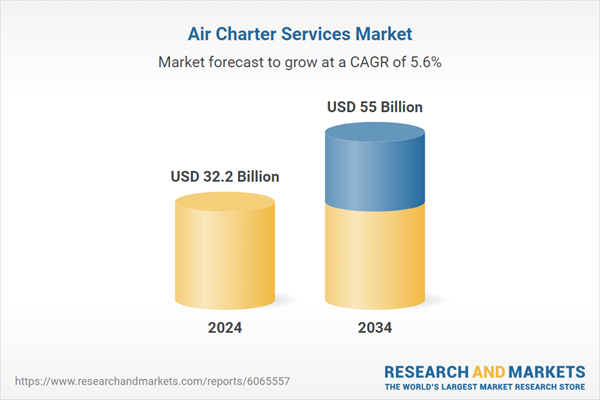This growth is fueled by the rising demand for private air travel, particularly among business travelers and high-net-worth individuals (HNWIs) seeking enhanced convenience, privacy, and flexibility. As more corporations and affluent individuals prioritize time-saving and seamless travel experiences, the demand for private charters continues to climb. Additionally, the surge in e-commerce and global trade has led to an increased need for efficient air cargo services, further driving market expansion.
The market's growth trajectory is bolstered by the increasing adoption of digital technologies, enabling companies to optimize booking processes and improve customer experience. Advanced fleet management systems and AI-powered solutions are streamlining operations and ensuring cost-effective service delivery. Companies in this space are scaling operations to meet evolving customer expectations by expanding fleet capacity, improving operational efficiency, and enhancing service customization. Moreover, rising geopolitical uncertainties and fluctuating commercial flight schedules have further contributed to the growing appeal of charter services, positioning them as a preferred alternative for both business and leisure travelers.
The air charter services market is segmented by aircraft types, including turbofan, turboprop, turboshaft, and turbojet planes. The turbofan segment is anticipated to grow at a CAGR of 5.9% through 2034, driven by increasing demand for faster, more efficient transportation solutions. Turbofan-powered aircraft, known for their fuel efficiency and reliability, are particularly popular in the air cargo sector, where they facilitate the bulk transport of goods and materials. Businesses seeking to streamline supply chain logistics and reduce delivery times are increasingly turning to turbofan aircraft, reinforcing their dominance in the market.
Service types in the air charter industry are generally categorized into group charters, private charters, and cargo charters. The private charters segment is expected to witness a CAGR of 6.1% between 2025 and 2034, owing to the rising demand for exclusive, premium air travel options. Both individual and corporate clients are gravitating toward private jet services that offer unparalleled flexibility, speed, and personalized experiences. These services are particularly appealing to high-profile executives and celebrities who value privacy, convenience, and the ability to travel on customized schedules.
The U.S. air charter services market was valued at USD 12.2 billion in 2024, reflecting the increasing demand for regional private aviation. As individuals and businesses seek customized air travel solutions, the U.S. market continues to grow, supported by the development of dedicated terminals and premium facilities catering to chartered flights. The shift toward private and regional air services is gaining momentum, driven by the desire for tailored, high-end travel options. With rising interest from corporate and individual clients, the air charter industry in the U.S. is well-positioned for future expansion, offering unparalleled flexibility and premium service to meet the growing demands of a sophisticated clientele.
Comprehensive Market Analysis and Forecast
- Industry trends, key growth drivers, challenges, future opportunities, and regulatory landscape
- Competitive landscape with Porter’s Five Forces and PESTEL analysis
- Market size, segmentation, and regional forecasts
- In-depth company profiles, business strategies, financial insights, and SWOT analysis
This product will be delivered within 2-4 business days.
Table of Contents
Companies Mentioned
The companies profiled in this Air Charter Services market report include:- Air Charter Service
- Chapman Freeborn
- Delta Air Lines Inc.
- Flexjet
- Gama Aviation Plc
- GlobeAir AG
- Jet Aviation Inc.
- NetJets IP LLC
- TALON AIR LLC
- VistaJet
- Wheels Up
- XO Global LLC
Table Information
| Report Attribute | Details |
|---|---|
| No. of Pages | 190 |
| Published | March 2025 |
| Forecast Period | 2024 - 2034 |
| Estimated Market Value ( USD | $ 32.2 Billion |
| Forecasted Market Value ( USD | $ 55 Billion |
| Compound Annual Growth Rate | 5.6% |
| Regions Covered | Global |
| No. of Companies Mentioned | 13 |









